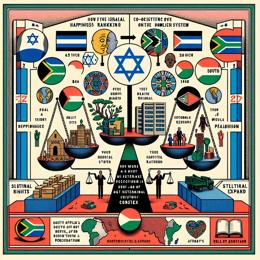Image created by AI
South Africa's Delicate Balancing Act Amid US Foreign Policy Concerns
South Africa's diplomatic endeavours have recently come under scrutiny following a series of actions that have put its relationship with the United States – a key economic partner – at risk. Amid concerns over the nation’s foreign policy direction, concerted efforts are being made to reconcile differences and safeguard economic ties.
At the crux of the potential policy crisis is South Africa's position as a beneficiary under the African Growth and Opportunity Act (AGOA), a trade program that allows for duty-free exports to the US market. Here, South Africa has enjoyed a predominantly advantageous trade surplus with the USA.
However, the longstanding partnership could be upended following a Bilateral Relations Review Act pushed by the US Congress, precipitated by South Africa’s perceived alignment with US adversaries and controversial groups such as Hamas. This bipartisan bill portends a comprehensive evaluation of South Africa's compatibility with US foreign policy interests.
The potential repercussions of losing AGOA privileges are stark. With an economy plagued by sluggish growth and industries under pressure, South Africa could face an economic downturn should the US revoke its preferential trade status, compelling American importers to seek more cost-effective sourcing alternatives.
South Africa's foreign interactions have raised eyebrows, particularly with the country hosting members of Hamas and engaging with Iranian officials shortly after terror attacks linked to such groups. Additionally, favourable receptions extended to Russian diplomats and the abstention from a UN vote condemning Russia's annexation of territories in Ukraine have amplified US concerns.
To navigate the convoluted geopolitical landscape, South Africa needs a nuanced recalibration of its foreign relations, balancing strategic interests with a firm commitment to democratic values and human rights. However, reframing relationships with countries like China, which is both a vital BRICS partner and a competitor within the African economy, adds to the complexity of the task.
The country's diplomatic pivot will necessitate assertive actions: distancing itself from contentious nations, condemning transgressions that contravene international norms and promoting democracy within the region.
In essence, South Africa's foreign policy reset involves both a revival of fundamental democratic principles and strategic re-alignments, which altogether serve to enhance its standing on the global stage while securing economic interests.

